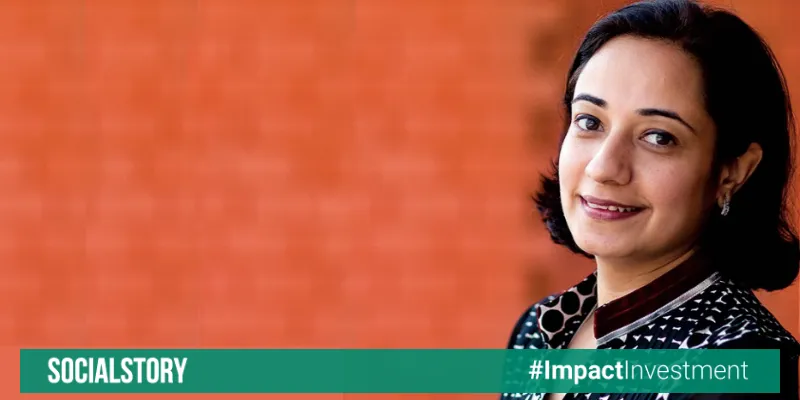How Geeta Goel led the Michael and Susan Dell Foundation to invest of $200 M in education, livelihood and microfinance in India
In an interview with YourStory, Geeta Goel, Country Head of Michael and Susan Dell Foundation, points out how India holds a plethora of opportunities for impact investment, where both measurable impact and profitability can be attained.
Geeta Goel has been spearheading the impact arm of Michael and Susan Dell Foundation across three countries- the US, India and South Africa. Since she came on board over 11 years ago, the organisation has made several investments in early-stage social enterprises. In India alone, the Dell foundation has invested $200 million across sectors like Education, Livelihood, and Microfinance.

In a conversation with YourStory, Geeta lets us in on the thriving space of impact investment and explains how a complex country like India should not be seen as an insurmountable challenge but rather as an opportunity to create true ground-level impact.
Taking the plunge
Having put in 12 years at PricewaterhouseCoopers in India, Geeta entered the social space in 2007. She manages the strategy and implementation of the Dell foundation’s work in India in two key areas of education and family economic stability. So how did leaving the corporate life for the social space work out for her? She says,
“What excites me about the development space is the fact that you can actually live and see the change in a space like this. As a sector, we need to change not one life at a time, but several lives at scale. Impact investment is one such platform that allows you to impact lives at scale. On the ground and human impact, continued sustainability are the three factors that have kept me going.”
Finding a niche
While the Dell foundation was not keen on impact investment when Geeta joined, they were sure that they would look at offering seed capital when it comes to early-stage companies and nonprofits. “
We wanted to give capital to these companies in the form they need, rather than in the form that we need. Which is when we started doing investments in early-stage companies through grants, accelerator programmes, seed funding and others,” she adds.
Though investment in education and livelihood has always paid off across the globe, urban microfinance was a tricky space, Geeta points out. In 2006, less than five percent of the microfinance market in India was urban. There were a number of factors that stopped organisations from investing in it - the lack of clarity, with loan takers migrating to other areas as well. This is when the Dell foundation invested in seven small-scale startups in the urban microfinance space between 2006 and 2009 to establish a strong microfinance sector through equity and grant.
Initial investments by the Dell foundation were in microfinance institutions like Ujjivan, Janalakshmi, Swadhar and Arohan, among others.
“These pioneers in urban microfinance proved their ability to scale and by this time, most of the rural microfinance firms had turned urban too, proving that scale can be achieved in this space. By 2012, 55 percent of the market was urban and that shift opened the markets and highlighted our role. Post 2009, we did not make any investment in urban microfinance and moved on with micro mortgages,” Geeta says.
Education in India is an evolving space with 300 million students in both government-run and private schools. Though the sector is noting many players and much innovation, the Dell foundation is concentrating more on creating consistent impact across geographies by raising the standards of teaching, rather than creating one big model school.
In the employment space, the foundation is keen on creating aspirational jobs rather than entry-level ones. “Jobs in the formal sector and with the government are limited so the best way is to get them into micro-entrepreneurship, and this will remain our focus,” Geeta adds.
Measuring impact
For all the naysayers about measurable impact, Geeta says it is absolutely possible. Decoding the factors with which the foundation measures impact, she says that they do not invest in companies in the pre-product phase, as it likes to note the difference before and after the product launch. For instance, in an investment related to education, once a product highlights the affordability and accessibility for a first-generation learner or a target segment through its product, the impact is palpable and can be measured.

The Dell foundation, which has so far invested in over 50 companies, has also exited eight. One of its portfolio companies, Ujjivan, which is today present in 24 states, had an exit when the company hit four million customers.
“When we exit, we also make way for other investors to come in and make their space. It’s the growth of the organisation, the type of investment and how they are priced that attracts an investor,” says Geeta, who is an IIM Ahmedabad alumnus.
Anchors of an investment
In India, the foundation’s goal is clear: to continue investing in education, livelihood, and microfinance. Under Geeta’s leadership, it is pumping $20 million -$25 million into these sectors every year.
“Impact, scale and sustainability are the three anchors of our investment, which is also why the Dell foundation takes keen interest in seed funds. In the last eleven years, the foundation has invested in seven seed funds where it can ‘divide and conquer’ in the areas of education, livelihood and financial inclusion,” Geeta points out.
On whether impact and profitability can co-exist in the social space, she says,
"There are many businesses and sectors that allow the two to blend together, a good example is an edtech product that is designed for the low-income consumer, and designed to create impact.”
Challenges and learnings
Geeta, who also chairs the Impact Investors Council in India, thinks that social entrepreneurs must not shy away from failures, as they are addressing complex problems. “The enthusiasm of social enterprises should always be welcomed if we want to create the next Silicon Valley; we have to have the high-risk capital and the entrepreneurial ecosystem for each of us to thrive,” she explains.
Before the Dell foundation found its sweet spot in the three sectors that it invests in today, it experimented with several other areas, including sanitation. Geeta recollects the time when they distributed Rs 10,000 to every household in rural Rajasthan to build a toilet. But this amount was used in bringing home a television rather than serving the actual cause.
Which is why she advocates for a system like the Swachh Bharat where the problem and the solution are looked through an ‘ecosystem approach’ lens and there are multiple stakeholders filtering out the loopholes and taking on a follow-up process.
She also believes that as investors it is very difficult to strike a balance between a ‘socially responsible investment’ and ‘impact investment’. She defines the former as an investment that does no harm on the environment and people, while the latter is an investment that is created with an intent to bring about positive change.

Since the Michael and Susan Dell Foundation concentrates only on early-stage investments, their return on investments are low and the risk of failure is quite high. "Some of our exits have been good investments; some of them have been write-offs. But what is now important is if the market is capable of taking up any of these interventions. Then, over a period of time, these companies need to deliver rates that the market will like, and which will also attract investors", she notes.
India- a thriving space for investment?
India’s complexity is an opportunity. There are challenges but they need to be viewed as business opportunities that are waiting to be addressed. Geeta says,
“Scale is an opportunity. A strong set of regulations is an opportunity because that is keeping the market safe and sound. We have income inequalities, we have significant social injustice but I believe we should look at the brighter side and that also is the bridge we are trying to build as a foundation. A lot of people say that the government systems are broken and the regulations are scattered, but that is your biggest market. Every challenge is an opportunity if you flip it.”







